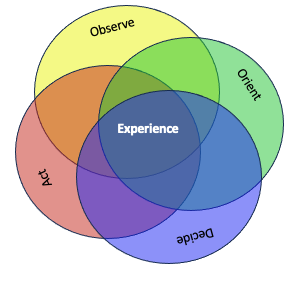
Have you ever been in a situation where you are looking for one person and another person, who you didn't expect approaches and remarks "Aren't you going to say hi?"
To which you reply, "I didn't even see you."
And they respond, "But you were looking right at me!"
Many years ago Ulrich Neisser illustrated this phenomenon experimentally and it has since been replicated in numerous experiments in which salient stimuli (e.g., people carrying umbrellas, gorillas, etc.) in the field of view are not 'seen.'
For me, this illustrates the intimate coupling between sensation, perception, cognition, and action or using the OODA Loop framework, between Observing, Orientating, Deciding, and Acting.
I wonder if the use of representations that illustrate the different functions as if they are separate isolated stages of processing might lead to misconceptions about the nature of human experience. Frankly, I believe that these are not independent stages of processing. Each stage blends (harmonizes) with the other stages such that the dynamics within each function are in part shaped by what is going on in the other stages. So - what we observe is shaped by our orientation (or framing of the problem), and by the options we are considering, and by our capacity for action. While simultaneously what we are observing is shaping the other functions.
A simple example is research by Dennis Proffitt that shows that our perception of the steepness of a slope is different depending on the weight we are carrying in our backpack.
The bottom line is that when we break human information into a sequence of discrete stages it is likely that we can lose sight of some of the relations from which human experience emerges. The functions are not like a sequence of dominoes, but more like a barber shop quartet, in which each voice (i.e., function) is blending with the others to create a sound that has unique emergent properties.
I wonder if we redrew the OODA loop as overlapping circles that blend together to produce our experiences - it would lead to different intuitions about the nature of cognition and expertise. What do you think? Does it strike a chord with you?
